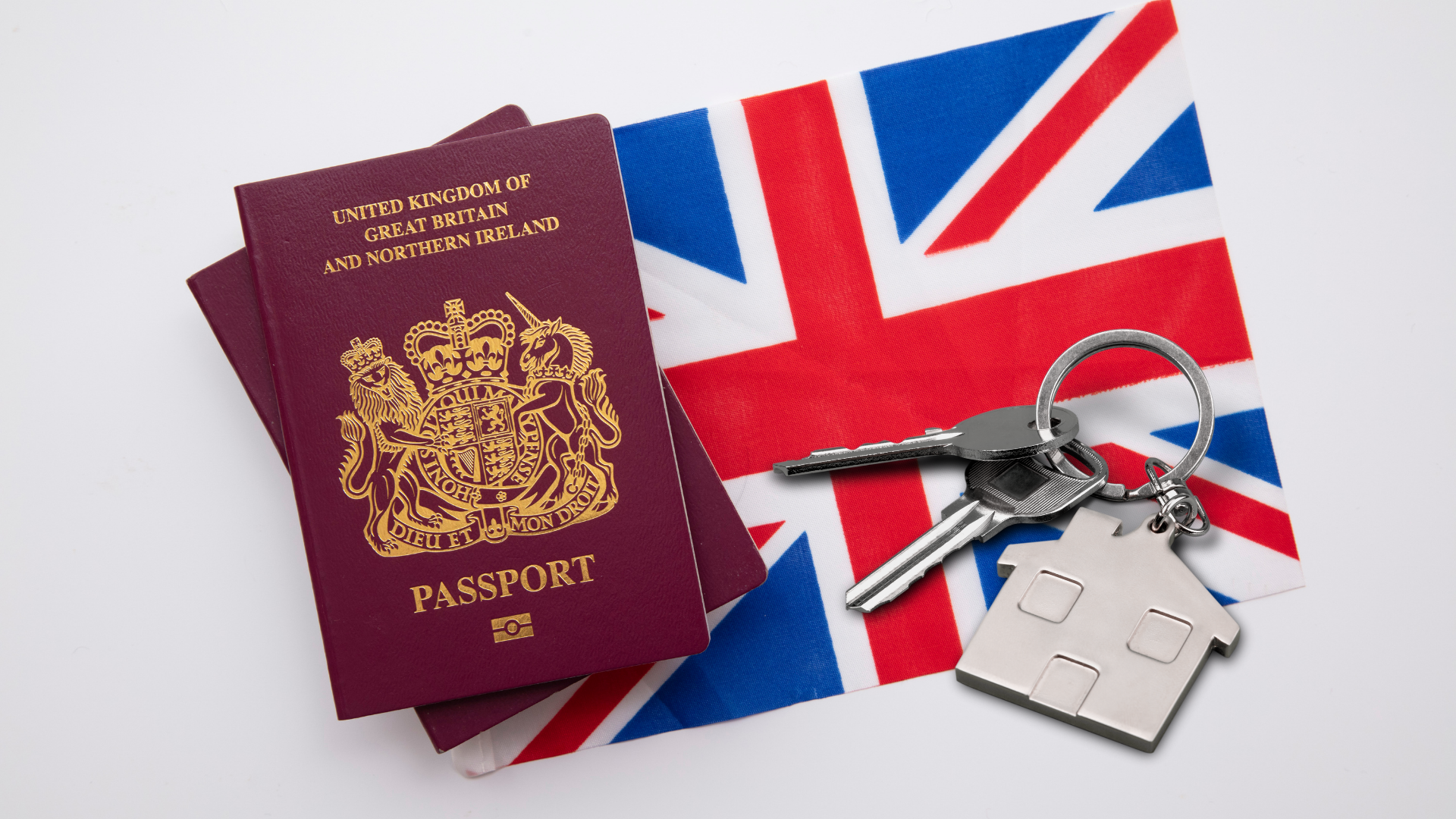- What Is Pre-Settled Status?
- How Long Do I Need To Live in the UK To Get A Mortgage?
- How Much Deposit Do I Need for a Mortgage?
- How Much Can You Borrow on a Pre-Settled Status Mortgage?
- What Documents Do I Need for a Pre-Settled Status Mortgage?
- Can You Get a Buy-to-Let Mortgage With Pre-Settled Status?
- How To Get A Mortgage With Pre-Settled Status?
- Tips For Getting Approved For a Pre-Settled Status Mortgage
- The Bottom Line
Can I Get A Mortgage With Pre-Settled Status In The UK?

If you’re an EU national living in the UK with pre-settled status, you may be wondering–can I actually get a mortgage to buy a home here?
The good news is that yes, it’s certainly possible to get a mortgage with pre-settled status from many lenders. 🎉
However, there are some important requirements around deposit, income, and documentation that you’ll need to be aware of.
Let’s dive into the key questions.
What Is Pre-Settled Status?
Pre-settled status is granted under the EU Settlement Scheme to EU, EEA, or Swiss citizens who have not yet lived in the UK long enough to obtain settled status.
This status lets you stay in the UK for up to 5 years.
During that time, you can work, use the NHS, enrol in education, and access public funds like benefits and pensions if you qualify.
After 5 years, you can apply for settled status, which gives you indefinite leave to stay in the UK.
Important Note: The deadline to apply for the EU Settlement Scheme was June 30, 2021.
If you were living in the UK before this date but missed it, you can only apply now with a valid reason for the delay. This allows you to keep your rights under the scheme despite the deadline passing.
How Long Do I Need To Live in the UK To Get A Mortgage?
The time you’ve lived in the UK significantly impacts your mortgage eligibility, but there’s no one-size-fits-all answer.
Each lender sets their own criteria.
Many lenders don’t have a strict minimum residency requirement, but they prefer applicants with a LONGER history in the UK. This reassures them of your stability and intention to stay in the UK.
For pre-settled applicants, you can apply for a mortgage anytime. However, a longer residency opens more doors.
Some lenders might require at least 3 years in the UK, while others are more flexible, considering applications even after 6 months.
The KEY is to showcase your commitment to staying in the UK.
The longer you’ve resided here, the better your chances of securing a mortgage with favourable terms.
Consulting a mortgage broker specialising in pre-settled status is recommended. They can match you with lenders most likely to approve your application based on your residency and overall profile.
How Much Deposit Do I Need for a Mortgage?
One of the biggest factors lenders look at for any mortgage is the size of your deposit.
Generally, the amount of deposit you need for a mortgage in the UK will depend on several factors, including:
- The lender’s policies
- Your credit score
- Your income level
- How long you’ve lived in the UK
Typically, lenders expect you to put down a deposit of between 5% and 25% of the property’s value.
For example, if you’re buying a £200,000 home, a 5% deposit would be £10,000, while a 25% deposit would be £50,000.
If you have pre-settled status, expect a higher minimum deposit requirement compared to British citizens.
However, there are some lenders out there who will accept smaller deposits from pre-settled status applicants, perhaps as low as 10% or even 5%.
But the downside is you’ll likely end up paying a higher mortgage interest rate in this case.
A BIGGER deposit makes you a less risky borrower in the eyes of the lender. This gives you a decent chunk of equity in the property and gives them more security.
It also means you’re borrowing a smaller loan-to-value, which helps you qualify.
How Much Can You Borrow on a Pre-Settled Status Mortgage?
Your borrowing power for a pre-settled status mortgage hinges on your household income and existing debts. Most lenders will typically cap your borrowing at 4-5 times your annual income.
For instance, with a joint annual income of £50,000 with your partner, you could potentially borrow between £200,000 and £250,000 – similar to what British citizens can borrow.
However, pre-settled status might mean stricter lending criteria or limitations on the maximum amount some lenders offer. They may perceive you as a slightly higher-risk borrower.
So while the income multiples may be the same, the lender could be more stringent on things like:
- Discounting bonus/commission income
- Factoring in debt repayments more heavily
- Requiring higher overall income
These factors could potentially lower the maximum amount you can borrow compared to a permanent resident.
What Documents Do I Need for a Pre-Settled Status Mortgage?
When applying for a mortgage with pre-settled status, you’ll need to provide standard documents like proof of income, bank statements, ID etc.
But you’ll also need proof of your residency status.
Specifically, lenders will want evidence that you have a valid pre-settled status from the EU Settlement Scheme. This could be things like:
- Share code from the EU Exit ID document
- Biometric residence permit/card
- Other immigration documentation
Providing this is crucial, as it shows you have the right to legally reside in the UK. Without this proof of status, you unfortunately won’t meet the requirements for a mortgage.
Other than this residency proof, the income documentation required is generally the same as any other mortgage applicant:
- Recent payslips
- Tax returns or accounts (if self-employed)
- Employment contract
- Proof of income source (investments, pensions etc.)
Having pre-settled status doesn’t mean jumping through any excessive hoops, but being very clear on the specific documents needed from your lender is important.
Can You Get a Buy-to-Let Mortgage With Pre-Settled Status?
While getting a residential mortgage for your own property is achievable with pre-settled status, what about buy-to-let?
The good news is that many BTL lenders will consider mortgage applications from those with temporary residency rights.
The bad news is that BTL mortgage deposit requirements for pre-settled status tend to be even higher at 25-40% in many cases.
You may also need to meet tighter rental income criteria to show your ability to repay the mortgage.
For example, the lender could require rental income to be at least 145% of the mortgage payment each month.
Other potential requirements include:
- Already owning another BTL or residential property
- Having a minimum income level (e.g. £25,000+)
- Avoiding new build or studio/1 bed flats
So in summary, BTL is certainly possible but be prepared for higher deposit requirements and rental calculations.
Using an experienced broker can help you find the most amenable BTL lender.
How To Get A Mortgage With Pre-Settled Status?
Getting a mortgage with pre-settled status in the UK involves several key steps. Here’s a straightforward guide to help you navigate the process:
- Find a Specialist Mortgage Broker – A broker experienced in dealing with applicants who have pre-settled status can be invaluable. They can provide guidance and connect you with lenders familiar with and accommodating of your status.
- Gather Necessary Documents – You will need to provide identification, proof of income, proof of address, and evidence of your pre-settled status. This may include your passport, pay slips, bank statements, and a share code to prove your immigration status.
- Get a Mortgage in Principle (MIP) –This is a statement from a lender saying they would lend a certain amount to you based on preliminary information. It’s not a guarantee but can help when house hunting.
- House Hunting – With your mortgage in principle, you can start looking for properties within your budget.
- Apply for the Mortgage – Once you find a property, apply for the mortgage. Your broker can help you through this process, ensuring you provide all required documentation.
- Complete the Purchase – If your application is approved, you’ll proceed to the exchange of contracts and eventually the completion of the sale.
Tips For Getting Approved For a Pre-Settled Status Mortgage
To maximise your chances of getting approved for the best possible mortgage with pre-settled status, there are a few key tips to follow:
- Boost your deposit as much as possible – Even a 30% deposit may open up far better rates and terms than just putting down 10-15%.
- Use a broker specialising in immigration cases – They’ll know which lenders have the most favourable pre-settled status policies.
- Be prepared with all documentation – Having things like address history, payslips, and immigration status proof ready to go smooths the process.
- Maintain an excellent credit record – Any issues like missed payments, maxed credit, or debt problems could severely hamper your application
- Consider getting a permanent UK residency visa – This may allow you to access more competitive mortgage products.
The Bottom Line
Don’t be discouraged by the extra steps involved in getting a mortgage with pre-settled status. As long as your finances and paperwork are in order, it’s definitely possible.
The key is to convince lenders you can comfortably handle the mortgage repayments.
With proper preparation and guidance from a qualified mortgage advisor, buying that home can become a reality even without permanent settled status in the UK.
Looking for the right broker? Get in touch with us. We’ll arrange a free, no-obligation consultation call with a qualified mortgage broker to help you find the best possible deal and avoid any potential setbacks.
Get Matched With Your Dream Mortgage Advisor...





